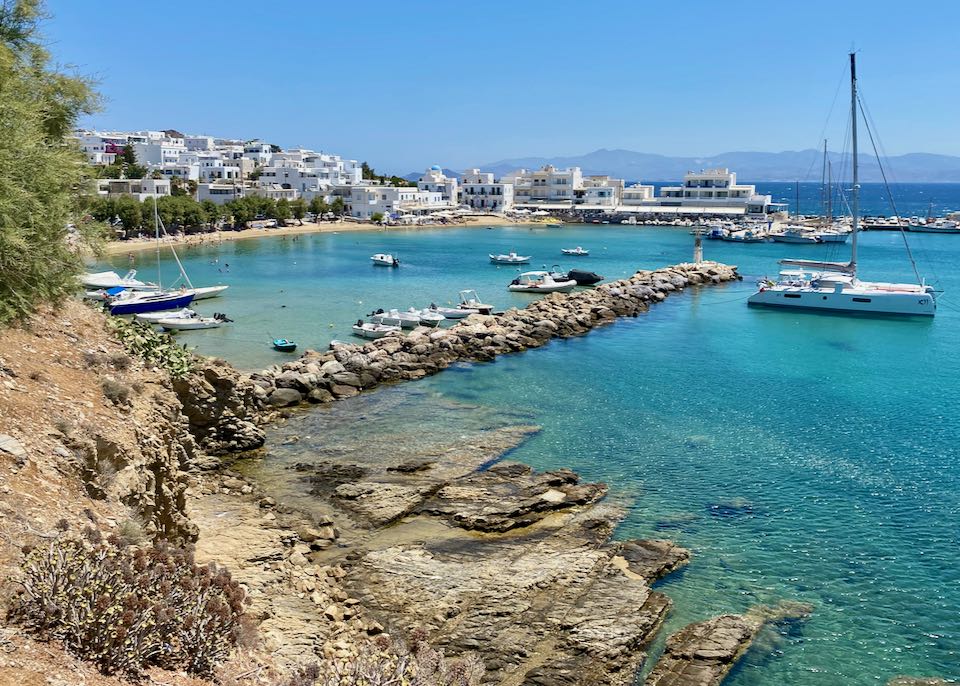Popular Hotels in Greece
The Athenaeum Luxury Hotel
Greece
$150The Athenaeum Luxury Hotel is a brand-new 5-star establishment located in the heart of Athens, Greece. This contemporary hotel features 52 rooms and suites, some offering views of iconic landmarks such as the Acropolis, Lycabettus Hill, and the Temple of Olympian Zeus. Guests can enjoy amenities like a plunge hydromassage pool and a fitness center, providing relaxation and wellness options after a day of sightseeing. The hotel's rooftop restaurant offers panoramic views of Athens, enhancing the dining experience with a unique cityscape backdrop. Guest reviews frequently highlight the comfort of the rooms and the exceptional friendliness and helpfulness of the staff. The Athenaeum's central location makes it a convenient base for exploring Athens, with many of the city's historic sites and attractions within easy reach.
Book NowGrand Hyatt Athens
Greece
$225Grand Hyatt Athens is a 5-star luxury hotel offering modern elegance, stunning Acropolis views, and world-class amenities. Located just outside the historic center, it provides a peaceful retreat while remaining close to Athens’ top attractions.Key Features of Grand Hyatt Athens: 📍Location: Situated on Syngrou Avenue, just a 10-minute drive from Athens' city center and the Acropolis. Close to Plaka, Monastiraki, and Syntagma Square. Easy access to public transportation and the Athenian Riviera.Accommodation: Luxury rooms and suites with modern décor, marble bathrooms, and premium furnishings. Acropolis-view rooms available. Smart TVs, minibars, air conditioning, and high-speed WiFi in all rooms. Dining: Rooftop Restaurant & Bar – Serves Mediterranean cuisine with breathtaking Acropolis views. The Grand by Interni – A stylish fine-dining restaurant with a fusion of Greek and international flavors. 24-hour room service.Amenities & Services: Rooftop infinity pool with Acropolis views. Luxury spa & wellness center with sauna, hammam, and treatment rooms. 24-hour fitness center. Concierge & limousine service. Business center & meeting rooms. Airport shuttle service (additional charge).
Book NowNYX Esperia Palace Hotel Athens
Greece
$200NYX Esperia Palace Hotel Athens is a 5-star lifestyle hotel known for its modern design, rooftop pool, and vibrant atmosphere. Part of the NYX Hotels by Leonardo brand, it offers a trendy and stylish experience in the heart of Athens.Prime Location: Situated in Syntagma, right in the city center. Walking distance to: Syntagma Square & Greek Parliament (5 minutes) Plaka & Monastiraki (10 minutes) Acropolis & Parthenon (15-20 minutes) Ermou shopping street (3 minutes) Well-connected to public transport (metro, bus, tram). Accommodation: Modern, stylish rooms and suites with bold décor and smart technology. Acropolis-view rooms available. High-speed WiFi, minibars, air conditioning, and flat-screen TVs.Amenities & Services: Rooftop swimming pool with Acropolis views. Luxury spa & wellness center. Fitness center with modern equipment. Business facilities & meeting rooms. Concierge & airport shuttle service (extra charge).
Book NowElectra Metropolis Athens
Greece
$300Electra Metropolis Athens is a 5-star luxury hotel located in the heart of Athens, offering stunning Acropolis views, elegant accommodations, and modern amenities. Known for its rooftop infinity pool and fine dining, this hotel is perfect for both business and leisure travelers.Prime Location: Situated in Syntagma, just a 5-minute walk from Plaka and Monastiraki. Walking distance to: Acropolis & Parthenon (15 minutes) Ermou shopping street (2 minutes) Greek Parliament & Syntagma Square (2 minutes) Easy access to metro, tram, and taxis. Accommodation: Luxury rooms and suites with a blend of classic and contemporary design. Many rooms offer private balconies with Acropolis views. Smart TVs, minibars, marble bathrooms, air conditioning, and free WiFi.Dining: Metropolis Roof Garden – Fine dining with breathtaking Acropolis views. M Bar (rooftop bar) – Cocktails and light bites with a 360° city view. Library Bistro – A cozy café for coffee, tea, and pastries.
Book NowKing George, a Luxury Collection Hotel, Athens
Greece
$500King George, a Luxury Collection Hotel is a 5-star luxury hotel in the heart of Athens, known for its elegance, historic charm, and stunning Acropolis views. Established in 1930, this iconic hotel blends classic sophistication with modern luxury, making it a top choice for discerning travelers.Prime Location: Situated on Syntagma Square, next to the Greek Parliament. Walking distance to top attractions like: Acropolis & Parthenon (15-minute walk). Plaka (Old Town), Monastiraki, and Ermou shopping street. Close to high-end boutiques, restaurants, and cultural landmarks.Accommodation: Elegant rooms and suites with neoclassical décor, high ceilings, and marble bathrooms. Many rooms feature balconies with Acropolis or city views. Luxury amenities: plush bedding, flat-screen TVs, minibars, and free WiFi. The Penthouse Suite boasts a private outdoor pool with Acropolis views.Dining: Tudor Hall Restaurant – Award-winning fine dining with Greek cuisine and breathtaking Acropolis views. 24-hour room service available. King George, a Luxury Collection Hotel is a 5-star luxury hotel in the heart of Athens, known for its elegance, historic charm, and stunning Acropolis views. Established in 1930, this iconic hotel blends classic sophistication with modern luxury, making it a top choice for discerning travelers.Prime Location: Situated on Syntagma Square, next to the Greek Parliament. Walking distance to top attractions like: Acropolis & Parthenon (15-minute walk). Plaka (Old Town), Monastiraki, and Ermou shopping street. Close to high-end boutiques, restaurants, and cultural landmarks.Accommodation: Elegant rooms and suites with neoclassical décor, high ceilings, and marble bathrooms. Many rooms feature balconies with Acropolis or city views. Luxury amenities: plush bedding, flat-screen TVs, minibars, and free WiFi. The Penthouse Suite boasts a private outdoor pool with Acropolis views.Dining: Tudor Hall Restaurant – Award-winning fine dining with Greek cuisine and breathtaking Acropolis views. 24-hour room service available.
Book NowHotel Grande Bretagne, Athens
Greece
$220The Hotel Grande Bretagne in Athens stands as a beacon of luxury and historical significance, situated prominently on Syntagma Square.Established in 1874, this iconic hotel has been a witness to Greece's rich history, hosting royalty, dignitaries, and celebrities over the decades. Its neoclassical architecture, adorned with Doric columns and mosaic flooring, exudes an old-world charm reminiscent of European palaces. The hotel's interiors are a testament to opulence, featuring restored antiques, original artworks, and lavish furnishings that transport guests to a bygone era. Beyond its historical allure, the Hotel Grande Bretagne offers modern luxuries that cater to the discerning traveler.Guests can indulge in the award-winning GB Spa, which combines ancient holistic rituals with contemporary wellness treatments. Culinary delights await at the GB Roof Garden Restaurant & Bar, where Mediterranean-inspired dishes are served against the backdrop of the Acropolis. For a more intimate experience, Alexander's Bar provides a refined setting, complete with an 18th-century tapestry depicting Alexander the Great. With its blend of historical grandeur and modern amenities, the Hotel Grande Bretagne remains a quintessential choice for those seeking an unparalleled stay in Athens.
Book NowCanaves Oia Suites
Greece
$560Canaves Oia Suites is a premier luxury resort perched atop the cliffs of Oia in Santorini, Greece.Originally 17th-century wine caves, these spaces have been transformed into elegant suites that blend traditional Cycladic architecture with modern sophistication. Each suite offers minimalist interiors, private plunge pools or infinity pools, and panoramic views of the Aegean Sea and the caldera, providing guests with a serene and luxurious retreat . The resort boasts exceptional amenities, including Petra Restaurant, which offers award-winning fine dining with breathtaking caldera views, and a grotto-style spa that provides signature treatments in a tranquil setting.Unique experiences such as private yacht excursions, bespoke wellness journeys, and artisanal activities like cooking classes and wine tastings are curated to enhance guests' stays . Notably, Canaves Oia Suites is the only property in Oia with an elevator, ensuring comfortable access to all levels, a rare convenience in the cliffside village . Situated at the entrance of Oia, the hotel offers proximity to the village's renowned marble path, blue-domed churches, and the historic Venetian Castle, while its elevated position guarantees maximum privacy and tranquility.With its blend of luxurious accommodations, exceptional service, and unparalleled views, Canaves Oia Suites provides an unforgettable Santorini experience .
Book Now.jpeg)






.jpeg)


















